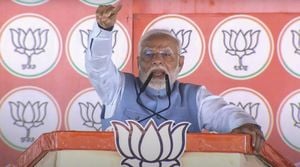Donald Trump’s political saga has always been intertwined with controversy, legal hurdles, and unexpected twists. His re-election campaign, marked by defiance against numerous criminal charges, raises significant questions about the potential for clashes between his administration and the Supreme Court. The upcoming term could illuminate whether the nation’s highest court can stand its ground against actions taken by the executive branch, particularly when Trump faces possible legal repercussions on various fronts.
During Trump's first term, the Supreme Court proved itself as both adversary and ally, standing against his more controversial initiatives. For example, the Court halted his attempts to implement travel bans targeting citizens from several Muslim-majority countries and barred him from adding citizenship questions to the 2020 census. Even the rescinding of Deferred Action for Childhood Arrivals (DACA) was dismissed by the Court as unconstitutional.
Fast forward to the present, and the stakes are even higher. With Trump poised for potentially another term, much hinges on the role of the Supreme Court. Historical patterns indicate the Court may need to navigate uncharted waters as they confront actions from Trump, especially with growing Republican dominance anticipated to influence Congressional pursuits. The looming threats here extend beyond typical executive decisions; it brings forth the tangible possibility of Trump attempting to sidestep judicial authority altogether.
Compounding these tensions is the undeniable decline of public trust toward the Court itself. Rising skepticism stems from both the justices’ contentious rulings and their perceived ethical lapses. Public sentiment carries weight, and if judges feel they lack popular support, the enforcement of their decisions could become tenuous. Imagining Trump outright ignoring unfavorable rulings, akin to Andrew Jackson’s notorious defiance against Chief Justice John Marshall, becomes far less far-fetched.
Adding to this climate of uncertainty, figures within Trump's circle have openly advocated for replacing civil servants with loyalists, echoing sentiments of establishing loyalty over legal fidelity. The prospect of Trump disregarding judicial oversight paints a vivid scenario: what if direct defiance becomes the new norm for presidents? Questions surrounding the Court’s authority and its role within the government will naturally arise, prompting wider discussions about the balance of power.
Trump's allies have often positioned themselves to support him regardless of legality, blurring ethical lines markedly. This trend suggests dangerous precedents, creating avenues for political leaders to potentially prioritize loyalty over foundational democratic principles. There’s no denying the gravity of where this can lead, with the risk of the rule of law being overshadowed by political allegiance.
Meanwhile, the recent election fraud indictments against Trump trigger additional legal battles. He faces 54 charges across various cases—defiance of elections, document mishandling, and other felonies entwined with election integrity. While he employs legal strategies to counter these claims, he simultaneously continues to leverage political battles. Allegations about unfair tactics directed toward him help mold his narratives, presenting himself as victim of political persecution.
Yet perhaps even more alarming is Trump's method and determination to shape public opinion. By framing his experiences with the law as politically charged narratives, he has painted himself as both martyr and revolutionary. His supporters rally around this, fueling sentiments of loyalty and generating substantial engagement on social media. This populist rhetoric has significant ramifications, shaping future political landscapes.
Trump's maneuvering through the legal system strategically portrays his penchant for delaying tactics. By stretching proceedings out, he creates the illusion of vulnerability rather than direct accountability. It's almost as if he’s mastered this cat-and-mouse game with civil institutions and mechanisms of justice, carefully plotting responses, hires, and counter offensives.
While legal experts analyze documents, investigations, and indictments, the intricacies of political maneuvering remain tightly entwined with public perception. What will emerge from these entanglements—law or loyalty? With short-sighted loyalties within factions of his party and masses refusing to abandon him, echoes of past governance tactics haunt contemporary political reality. Have Trump and his allies reshaped the definition of loyalty within the judiciary and government?
Through such dynamics, we find ourselves at the crossroads of legal intrigue and the fate of government integrity. The Supreme Court soon faces unprecedented challenges, seeking to uphold legal standards contrasted against political commitment and allegiance. Yet as history implicitly shows—an era marked by checks and balances may be on the line.
The impending decisions made both within the Supreme Court and the executive office can either restore faith or deepen divides among the populace. With Trump utilizing the legal system as both shield and sword against opposition, the environmental factors surrounding these cases become pronounced. Will the Court find the resolve necessary to stand against these swings of political power? If history is any indication, their willingness to confront the growing executive prominence will be tested harshly over the next term.
The stakes have never been higher as public confidence wanes and tensions rise. Trump’s grip on political discourse might now find its counterbalance within the judicial arm. Issues of legality, morality, and power are layered thick as opinions shift under the pressure of potential court continuance.
What lies within the balance of Trump's ambition and the ultimate capacity of the Supreme Court to retain authoritative decree remains yet to be seen. With upcoming trials, charges, and political maneuvers surfacing daily, immediate reflections on the outcome become not just necessary, but urgent. Meanwhile, core responsibilities arise—who will maintain the ideals of democracy, governance, and impartial justice amid swirling discord?
Truly, America teeters on the brink of numerous consequential decisions—an era of confrontation against foundational ethics in law and governance beckons.



